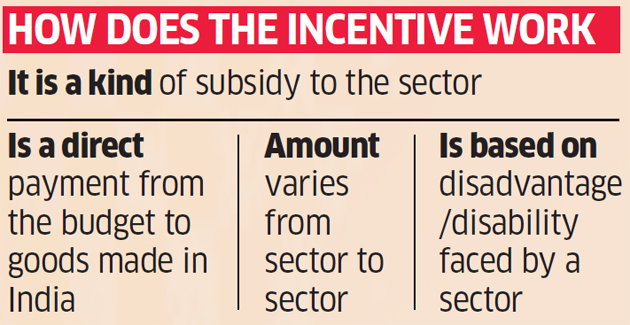Indian Economy
PLI Scheme for IT Hardware and Pharmaceuticals
- 26 Feb 2021
- 4 min read
Why in News
Recently, the Union Cabinet has cleared Production-Linked incentive (PLI) schemes for pharmaceuticals and IT hardware, including laptops, which would cost the government as much as Rs. 22,350 crore.
- Earlier, the government had announced the PLI scheme for medical devices, mobile phones and specified active pharmaceutical ingredients, with a proposed outlay of Rs. 51,311 crore.
Key Points
- PLI Scheme:
- It aims to give companies incentives on incremental sales from products manufactured in domestic units.
- It invites foreign companies to set units in India, however, it also aims to encourage local companies to set up or expand existing manufacturing units.
- IT Hardware Sector:
- About:
- The scheme, worth Rs. 7350 crore, will offer 1-4% cash incentives on net incremental sales (over base year 2019-20) for IT products manufactured in India.
- The Target Segments include Laptops, Tablets, All-in-One PCs and Servers.
- Duration: 4 years
- Benefits:
- India will be well positioned as a global hub for Electronics System Design and Manufacturing (ESDM) on account of integration with global value chains, thereby becoming a destination for IT Hardware exports.
- Employment Generation potential of over 1,80,000 (direct and indirect) over 4 years.
- Provide impetus to Domestic Value Addition for IT Hardware which is expected to rise to 20-25% by 2025.
- About:
- Pharmaceutical Sector:
- About:
- The Rs. 6,940-crore PLI scheme implemented in 2020 focuses on the critical bulk drugs, whereas this scheme is likely to focus on other types of bulk drugs.
- It intends to give incentives between 2020-21 and 2028-29 (9 years).
- Drug manufacturers applying for the scheme will have to be registered in India and will be placed into one of three categories based on their Global Manufacturing Revenue (GMR).
- Categories of Drugs Targeted by the Scheme:
- First Category:
- It includes biopharmaceuticals, complex generics, patented and orphan drugs, often expensive for which India relies a lot on multinational drug makers.
- Second Category:
- It comprises Active Pharmaceutical Ingredients (APIs), Key Starting Materials (KSMs) and Drug Intermediates (DIs).
- Third Category:
- It includes other critical repurposed, auto-immune, anti-cancer, anti-diabetic, anti-retroviral, anti-infective and cardiovascular drugs as well as in-vitro diagnostic devices and drugs not manufactured in India.
- First Category:
- Incentives:
- For First and Second Category:
- 10% of incremental sales value for the first four year of the scheme, followed by 8% for the fifth year and 6% for the sixth year of production under the scheme.
- For Third Category:
- 5% of incremental sales value for the first four years, 4% for the fifth year and 3% for the sixth year.
- For First and Second Category:
- Benefits of PLI in Pharmaceuticals:
- Reduced Dependency on China:
- India’s capabilities in APIs have reduced over the years, mostly due to cheaper alternatives from China.
- The pharmaceutical industry here is currently dependent on the bordering country for nearly 70% of the bulk drugs it imports.
- Enhance Exports:
- The Indian pharmaceutical industry is the third-largest globally in terms of the volume term of production and is worth USD 40 billion in value.
- The country contributes 3.5% of total drugs and medicines exported globally.
- Reduced Dependency on China:
- About:







